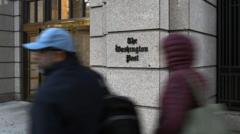Ann Telnaes, a distinguished cartoonist with the Washington Post since 2008, has decided to resign after the paper rejected her satirical cartoon of Jeff Bezos, which depicted him alongside other tech billionaires in a depiction of reverence towards a statue of President-elect Donald Trump. Telnaes expressed that the refusal to publish her work was a significant turning point and a threat to press freedom.
The rejected cartoon illustrated Bezos, Meta's Mark Zuckerberg, and OpenAI's Sam Altman on their knees offering bags of cash to Trump’s statue, and was intended to critique the strong influence that wealthy executives wield over political outcomes. In her statement, Telnaes emphasized her discontent with the failure to publish a cartoon that falls within her critical role as an illustrator and commentator, stating that it marked an "unprecedented" moment in her career.
David Shipley, the editorial page editor at the Washington Post, defended the decision not to run Telnaes' cartoon by asserting it was based on editorial redundancy, referring to an upcoming satirical piece covering similar themes. Shipley has attempted to reinforce that editorial decisions are not motivated by any "malign force," attempting to mitigate the implications of potential conflicts of interest given Bezos’ ownership of the publication.
This incident is not unprecedented, as in 2015, Telnaes faced a similar situation when a cartoon depicting Ted Cruz's young daughters was withdrawn due to the publication's policy of avoiding the portrayal of minors in politically charged contexts. The question of editorial freedom is being put front and center in light of previous tensions surrounding Bezos’s influence over the Post’s editorial direction, particularly when it comes to endorsements or criticism of political figures, underscored by subscriber backlash after the paper abstained from endorsing Vice-President Kamala Harris ahead of the November elections.
This incident reveals broader concerns about the potential compromises faced by journalists in publications owned by powerful individuals. The responses from both Telnaes and Shipley underscore the complicated dynamics within editorial decisions, especially in a politically charged environment.
The controversy surrounding Telnaes’ resignation raises critical questions about editorial independence and the implications of media ownership on freedom of expression, a dialogue that continues to resonate amid changing landscapes in the world of journalism.




















